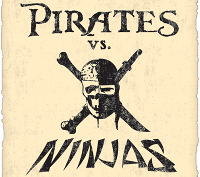
The sci-fi TV series Caprica was canceled on October 27th, 2010. Its cancellation reflects the decreasing sustainability of the cable TV business model. A better, more modern business model could have saved Caprica from cancellation. If this model is adopted in the future, it could save many other similar niche genre shows from the same fate down the road.
Your humble CEO
Suppose for a moment that I had been CEO of NBC Universal at the time Caprica was picked up in 2008. If I had been CEO at that time, then Caprica would not have been canceled during its first season two years later because it would have been one of the many thriving, profitable properties owned by NBC Universal. Here's how I would have succeeded where they have failed.
Recognizing that cable TV is a dinosaur business model

Cable TV is a dying business model rapidly on its way to becoming extinct. Statistics have shown that over the last several years, the subscription growth rate has been flattening. In Q2 2010, the total number of subscribers dropped for the first time in history and there's no sign that this decline is going to stop any time soon. Fierce competition from the internet is devastating cable TV.
The internet competes with cable TV by making it easy for people to download episodes whenever they like; on demand. Not only is this a better user experience than being forced to watch episodes live or tinkering with DVRs, but it's also often cheaper, as most places on the internet where you can find TV shows offer them for free and with fewer ads.
Because of this, the younger, tech savvy viewers in increasing numbers are rejecting cable TV and choosing to go online instead. As Clay Shirky once remarked about the decline of newspapers, "no medium has ever survived the indifference of 25-year-olds." Like newspapers, cable TV is suffering mightily at the hands of this generation of kids, who increasingly view it as an irrelevant medium.

Pirate ships ahoy!
Many folks in the television industry don't see internet video as a terribly credible threat to cable TV because many reports, such as the Nielsen study that Ars Technica reported on above, claim that only one percent of all television is consumed online. The trouble with that statistic is that it fails to account for piracy, a massive oversight. According to one rather conservative estimate, there are at least 60 million people pirating TV shows, and that number grows every day.
With the piracy rate rising and the cable TV subscription rate dropping, studios which produce TV shows such as those owned by NBC Universal are increasingly becoming less profitable. As this happens, niche TV shows with lower profit margins, such as Caprica, are among the first to get axed. Other shows with broader appeal then take the place of those that are canceled, but this strategy is little more than a bandaid on a gushing, open wound that is the doomed cable TV business model.
Piracy is competition, not stealing

As NBC Universal's humble hypothetical alternate reality CEO, my strategy is simple. Piracy should be treated like competition, not illicit behavior. Despite piracy not being legal, it is nevertheless widespread and inevitable. Organizations such as the RIAA, MPAA, and BSA have been trying in vain for years to stomp out internet piracy in their industries, but their efforts have been utterly unsuccessful as millions upon millions of people continue to engage in this illegal activity in total defiance of the law.
The sheer scale of civil disobedience at work here has not been seen since the U.S. alcohol prohibition of the 1920s, and we all know how ineffective efforts to enforce that law were. So, despite however you may feel about the morality of internet piracy, it is for better or worse here to stay and massively popular. It's so popular because the user experience is significantly better. You can download high definition episodes with no interstitial advertising entirely for free from numerous sources. The only way to compete against this is to offer something as good or better.
How to compete against piracy

I've put together a straightforward, six point guide for how NBC Universal can offer its television content in a way that's competitive with piracy, but still drives significant revenue.
- All of NBC Universal's properties should immediately begin offering full episodes in high definition on the web. These episodes should be available online at the same time they air on cable TV. Delaying the posting of these episodes to the website will only drive people to piracy.
- Episodes offered via this medium should display no interstitial advertising. Ads should only appear just prior to and just after an episode plays. Interstitial advertising will only drive people to piracy, which shows no interstitial ads.
- No DRM should be used to region lock the episodes or protect against consumer copying or saving of the episodes from the website to their computers. This will only drive people to piracy.
- The online episodes should be the same high quality aired on cable TV. Reduced quality will only drive people to piracy. Bandwidth costs can be reduced by leveraging bit torrent.
- A subscription service should be offered which completely eliminates all advertising for the subscriber and offers other benefits, such as discounted merchandise and other additional services above and beyond the basic TV content without ads.
- Nothing behind the subscription paywall should be something that can be pirated. Services and physical merchandise cannot be pirated.
With this as NBC Universal's strategy, pirates no longer have a reason to pirate episodes. These would-be pirates would now suddenly be contributing advertising revenue in large volumes whereas under the old model they contribute absolutely no revenue to the shows they love. Many other would-be pirates would actually become subscribers as well in order to have the ad-free experience, something which not even piracy can offer very well, since most pirate sites have ads too.
Stated quite simply, this is the only business model that will turn pirates into revenue-generating customers.
But I wasn't NBC Universal's CEO in 2008

Had NBC Universal made the bold, radical choice to offer this web-based business model for their TV shows in addition to their cable TV services, and had they signed equitable advertising deals to support this new model, I'm quite confident Caprica never would have been canceled. The fact of the matter is NBC Universal's failure to embrace internet distribution, cultivate a top-notch internet TV viewing experience, and get advertisers onboard with the idea is a significant waste of a lucrative business opportunity.
But it's not just NBC Universal. It seems like every major TV company is playing with fire by ignoring the internet. Over time, their profits will keep shrinking as piracy rises and cable subscriptions dwindle and they'll have to keep canceling good, niche shows only to be replaced by other more generic shows with broader appeal to compensate for this trend.
As was said so often on Battlestar Galactica, the popular sci-fi TV series which Caprica was spun off from, "all of this has happened before, and all of it will happen again." As this cycle continues, eventually it will wear thin and the business model will no longer be able to sustain even the most broadly appealing shows. Failure to embrace new technology is slowly strangling television to death.
Life fails to imitate art

Ironically, the Caprica TV series actually addressed the piracy issue in a very poignant way during its short run. In the episode There Is Another Sky, the character of Daniel Graystone grapples with Caprica's equivalent to piracy bogging down his company's profitability. In response to this, Daniel says, "the hacked sites are eating up more and more of our market share each quarter. And that's where the kids are going, because they're free. And the next generation coming up? They'll expect it all to be free." He goes on to say, "we can either marshal all our resources and funds toward saving that sinking ship or we can look for the next big thing."
The next big thing for media consumption is the internet. It has been for quite some time now. The TV industry by and large is completely and utterly failing to recognize that. They're marshaling all of their resources and funds trying to save their sinking ship, but it won't work because the kids have a different expectation and they're showing the world their expectation for how media should be consumed in the 21st century with the staggering piracy rates. Had someone as forward thinking as Daniel Graystone been CEO of NBC Universal, then perhaps Caprica would still be on the air.
So say we all.
